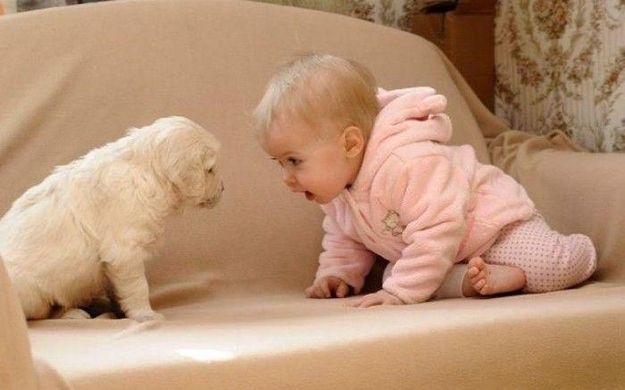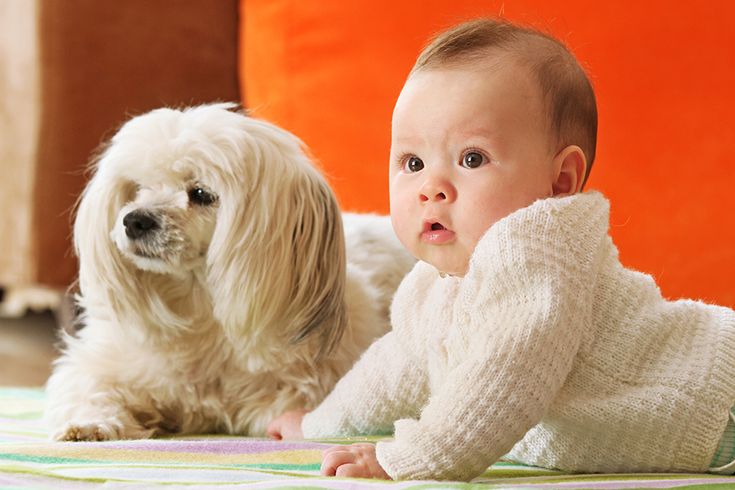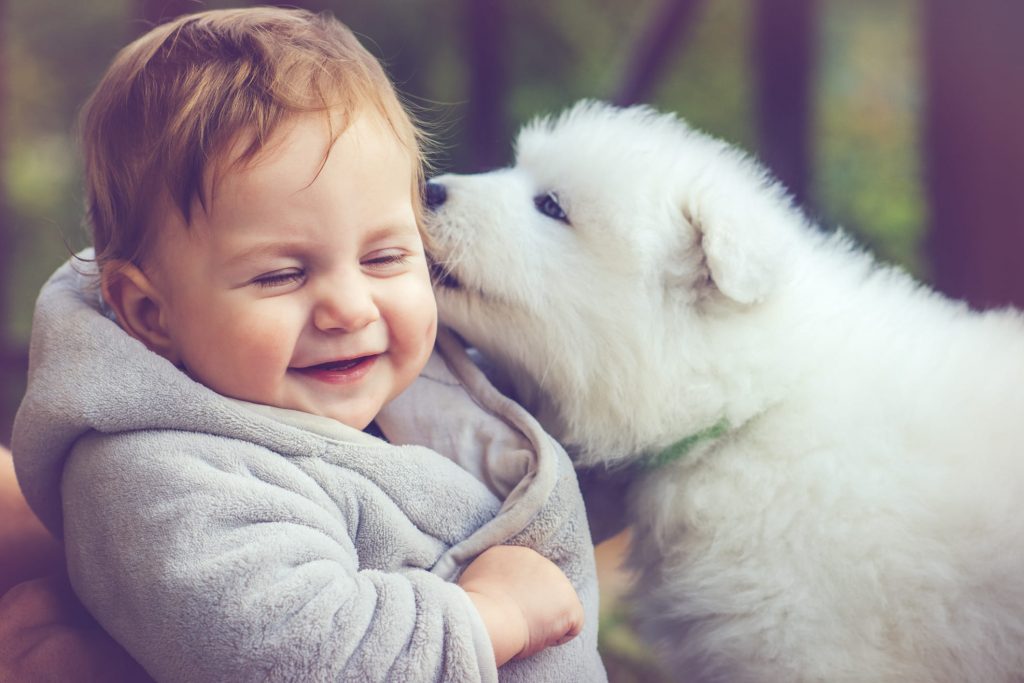It’s one thing to grow up with human siblings, but what about our canine siblings? Many of us have grown up with dogs or cats who are as much a part of our family as our human brothers! Growing up with dogs has several great benefits that have been noted, from newborns up to adulthood.

Dog owners very well understand that dogs are the best way to develop our children’s creativity and outdoor skills. They also give children a sense of belonging, security, confidence in themselves, and a sense that their parents care about them!
Though dogs are generally very gentle around newborns, they can also be oblivious to their inability to interact or move. Do not leave a newborn within reach of your pet unattended until they have gotten to know each other much better, but their presence will greatly benefit the health and happiness of your new baby.
Let’s look at some of the many ways that having a dog can benefit children of all ages.
Helps to develop immunity in your babies
Studies state that children who have pets are healthier than their counterparts. They have a strong immune system that naturally protects them from disease. As a result, their health improves, and they only visit the hospital on rare occasions. Researchers have found that owning a dog lowers a child’s risk of developing asthma and allergies. Dogs can also encourage children to exercise more. Walking a dog helps children meet their daily activity recommendations, which is especially important for those who spend too much time indoors.
According to studies, children who have pets are less likely to develop asthma. No one knows how this works yet, but speculations suggest that constant exposure to animal furs strengthens children’s lungs and keeps the air passage clear.
Babies born into a home with pets have a lower risk of developing a variety of allergies due to a boosted immune system, as well as being less sick overall in their first year of life. This stems from their early interactions with their furry family. So, don’t be afraid to let your dog be around the baby, as being in your pup’s presence and exposing yourself to bacteria could be beneficial! Just make sure to keep an eye on things.
Assisting them in learning to speak
As your child begins to learn about the world and their family, the bond between you and them begins to strengthen. This is also the time when they begin to learn commands by watching their parents speak to their dogs. Commands are simple, one-word instructions, and they are likely to be one of the first things a child is drawn to when learning to speak, out of a desire to communicate.
I’ve seen babies as young as one learning to say “come,” “sit,” and “down” when the majority of their speech is baby babble. This encouragement will help them progress through their speech more quickly. Dogs make excellent companions and can shower children with love and affection. A dog is a good playmate for a child as well as someone they can talk to when they want to be around animals.
Acquiring Basic Responsibilities
However, youngsters want to attempt petting their pets after seeing their parents pet the puppy. In order to avoid upsetting the dog, they are trained to be kind and sensitive when handling it as they learn how to engage with it.
They frequently behave more tenderly toward people and with care toward other animals, and this gentleness permeates every facet of their lives. It is more likely to persist into the copycat phase because they were taught the behaviour from an early age. They will be kinder when they enter school and learn how to interact with many other children their age thanks to this kinder approach.

Loving and Sharing Unconditionally
Your baby will love you regardless of whether or not there is a dog in the house, because it is human nature to love their parents from the moment they meet. They will, however, learn to love something other than their flesh and blood through their canine siblings. Learning to love something that isn’t even of the same species as you is a very special tool that will help a child become more open with others as they grow.
Sharing items with their pets is one way for children to bond with them. Children and their pets share food, drink, thoughts, and ideas. They look for those special moments when they can give something to their pets. The pets never have to ask for it, which is a plus. As a result, children learn to share things with others at their discretion.
Pets make excellent companions for children. They play together and eat together. Furthermore, children talk to their pets and believe that they are being talked back to. This makes children who have pets feel less lonely. They know they have a constant companion in their pet, and they will never tire of playing with them. Such a child would rarely be lonely.
Companionship and Bonding
Both your child and your dog will be much happier if they have a furry playmate to run around with all day (and you will get to rest while they tire each other out). A dog’s energy is similar to that of a child in that it seems to last forever! As a result, they are a perfect match. A child will learn to play and interact with another just as well as they would with another baby, if not more cautiously. More exercise leads to improved fitness and a lower risk of obesity.
Your puppy will become your child’s best friend. They will play, learn, connect, and explore together, and your pup will protect them. Their bond will only grow stronger over time. Dogs learn to recognize when a baby is sad, happy, angry, stressed, or scared and will figure out how to best assist. The love of a dog is unconditional, and they will always be there for their best friend.
A new morning is a miracle of infinite possibilities for a child and a dog. Not only does having a dog as a sibling provide medical and developmental benefits, but it also provides a child with a childhood filled with friendship, companionship, care, and love. Something we dog lovers are all too familiar with! That is why they are dubbed “Man’s Best Friend.”
Skill and Social Development
A dog follows a disciplined regimen that the children observe as they grow up and become accustomed to, discipline, and social responsibility. Dogs are also fed at regular intervals, which helps the children understand the importance of consuming meals on time at home.
Your playful pooch will encourage your little one to go outside in addition to providing someone to run around with. More time spent outside means a better appreciation of nature, plenty of vitamin D, and a better understanding of alternative ways to spend their time besides hiding away indoors. And going for walks with your dog will expose your beautiful baby to many new and exciting outdoor spaces. Spaces that they will almost certainly want to explore on their own one day and adventures that will only serve to fuel their imagination.
Children who keep an eye on the dog and participate in this process will naturally learn how to be responsible for another living being. Dogs also help console children who are hurt or upset by entertaining them with dog antics.
Children can easily interact with the dog as dogs are very accommodating. They must demonstrate animal affection and care, which teaches children empathy and other social skills. During playtime, a child can also learn how to communicate with and interpret a dog’s body language.
Children with disabilities can benefit from assistance dogs.
Dogs are being trained as service animals to help autistic children. When a dog is properly trained, it can help a child feel more at ease in public, reducing anxiety and encouraging social interaction.
According to a 2013 study, service dogs helped autistic children improve their nonverbal communication skills, such as eye contact and facial expressions. Children who live with dogs will have a trustworthy friend with whom they can share their emotions. When no one else is accessible, the dog exhibits sympathetic behaviour toward their issues or challenges and acts as a listening ear, giving the kids a much-needed sense of dependability and support.
When no one else is around, a dog can provide children with entertainment and companionship. This makes the animal a valuable companion for those who must spend time alone due to the work schedules of their parents, and it can help to prevent boredom and other negative behaviours.

Dogs can help with stress and anxiety.
Dog ownership can help a child feel less isolated and lonely. Dogs provide companionship and emotional support to children who may be lonely, as well as those who require a reliable friend.
These animals provide important sources of entertainment for children who live in areas with few other children or do not have anyone to play with after school. Children face stress as well. They are sometimes stressed at school. Anxiety can also be caused by a lack of quality sleep. However, children are allowed to talk to their pets about their anxiety and what they believe is causing their symptoms. Children unburden themselves on their pets, feeling better in a short period of time.
Dogs do not discriminate against the people they like, and they will be affectionate toward their owners regardless of race or socioeconomic status. This can assist children in developing positive relationships with people who are different from them.
Children learn that everyone deserves to be loved unconditionally, which increases their likelihood of accepting people in their lives and the world around them.
It teaches them accountability.
Children who have pets must provide the best possible care for the animals. Depending on their age, they would most likely be in charge of cleaning the pet’s house. They would also ensure that the pet is properly fed and has access to drinking water at all times.
For example, children who own boxers must conduct the necessary research to determine the best dog food for boxers because such breeds will not eat just any type of dog food. All of these activities teach children to accept responsibility. And they would have mastered the act of being responsible after a long period of living with pets.
It aids in the formation of healthy habits
Children who have pets would be able to move around the neighbourhood more frequently. Kids with dogs, for example, would have to take them for walks, which would require them to run as well. Running and walking will keep a child physically fit, and they will remember the habits when they are older.
Another example would be dog food. Dog owners in the United States are encouraged to provide all-natural pet treats to their dogs in order to keep them healthy. Of course, children who have dogs who are always snacking on healthy treats would be interested in learning why healthy eating is important. And once the children understand the importance of healthy foods, they will incorporate them into their lifestyle as well.
It boosts their self-esteem. and builds Confidence
Pets are like humans to children. As a result, they attempt to relate to the pet in the same way that they would to their peers their age. They converse with the animals, play, cuddle, and even become enraged with them. All of these expressions of their innermost feelings toward their pets without fear of being judged would significantly boost their self-confidence.
One of the primary reasons for having pets is that they make excellent playmates. They also get to play more with children. Siblings who have pets will usually want to play with them. Because only one person can claim ownership of the pets, the siblings will learn to play together and stay happy. Siblings who have pets have something to distract them from the constant fighting and arguing that children are prone to.
Children get more physical activity than adults and benefit from all of the fun games that involve fetch or frisbee. Playing with a dog allows you to get outside and exercise every day without feeling like you’re doing it. Dogs allow children to stay active and healthy, which is especially important given that many children today do not get enough physical activity
Dogs can provide excellent protection for children.
Children who live with dogs frequently feel safer and less fearful of the dark or things that go bump in the night. When children have a dog to care for and protect them, they may feel more confident and capable.
Dogs can provide an added sense of security, particularly for families living in dangerous areas or those concerned about home security.

Last Words
Growing up with dogs has many benefits for children, including improved health and reduced anxiety. They also learn empathy and responsibility at a younger age. Consider getting your children a dog if you want them to reap these benefits as well.
Before committing, parents should consider whether their child is ready to care for a dog. It is important to note that dogs typically live for ten or more years, so children must raise them from puppyhood if they are under the age of ten.
Disclaimer: The author’s views are his or her own. The facts and opinions in the article have been taken from various articles and commentaries available in the online media and Eastside Writers does not take any responsibility or obligation for them.
Note: Contact our Writers at www.eastsidewriters.com for writing Blogs/Articles on any niche. We have experts in various domains from Technology to Finance and from Spirituality to Lifestyle and Entertainment.
Originally posted 2022-11-09 02:17:33.







Pingback: Why Dog Is Undoubtedly Man's Best Friend Under Every Situation